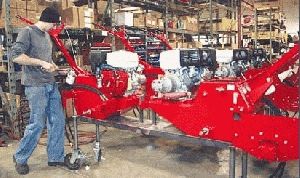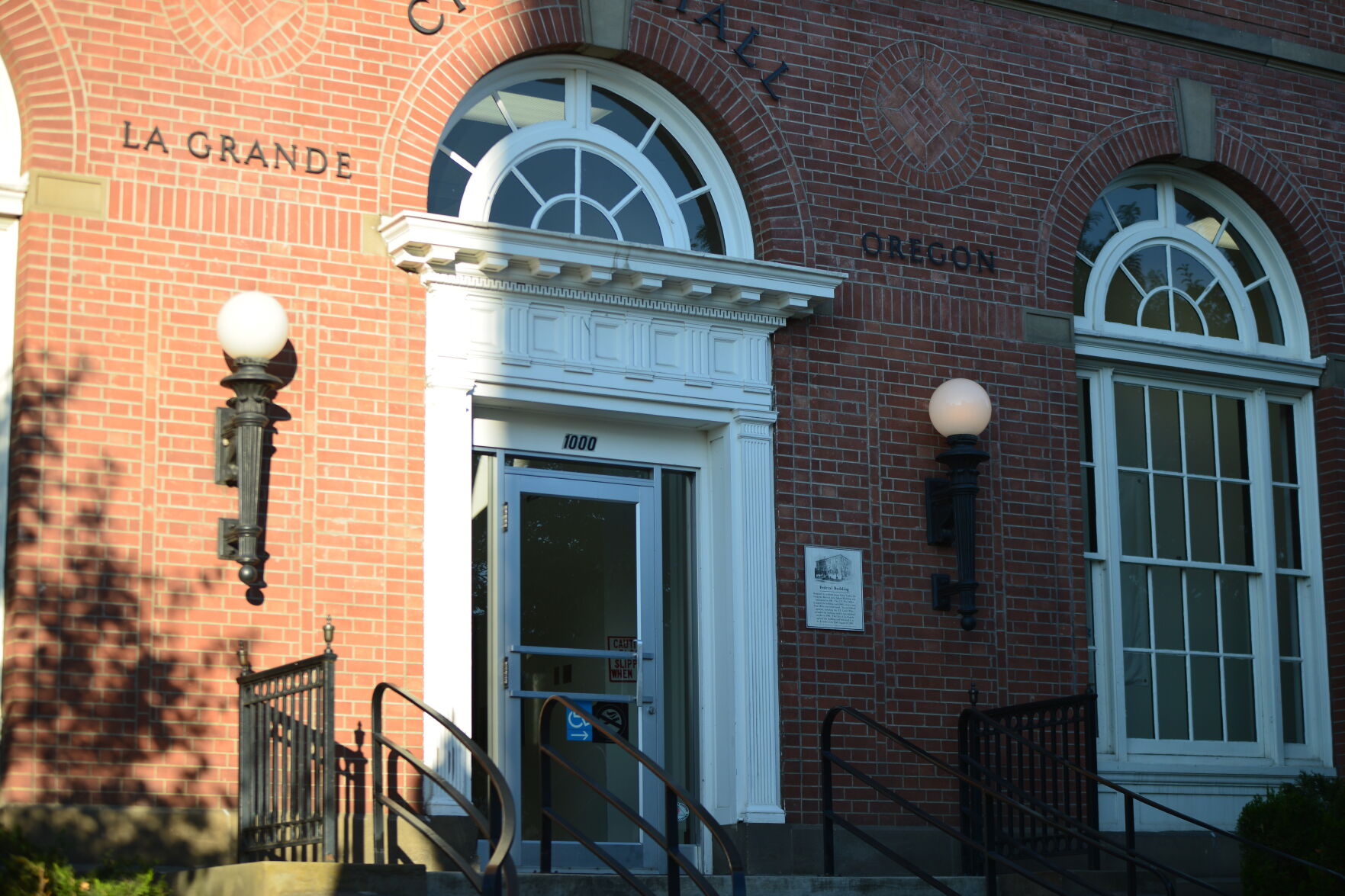BARRETO EMERGES AS TOP PRODUCER OF ROTOTILLERS, TRENCHERS
Published 12:00 am Wednesday, January 19, 2005

- Adam Wickander works on a rototiller assembly at the Barreto plant at the Union County Industrial Park. ().
Bill Rautenstrauch
Staff Writer
Mechanical aptitude and business acumen can be a potent mix. Combine the two, and a success story is the likely result.
For proof, take a drive out Highway 203, east of La Grande. Go a short distance past Hot Lake. Look for an unadorned sign bearing the single word "Barreto." Take the turn.
You’re at the headquarters of Barreto Manufacturing, makers of rototillers and trenchers, and trailers that are used to haul the two.
The parking lot outside the big main building is full, a sure sign of robust activity.
Inside, beyond the reception area, dozens of workers are busy shaping parts for machines that will be shipped all over the world.
Success story? At this location and another in the Union County Industrial Park, some 65 Barreto employees work to turn out products that are sold the world over.
And it all started with one man building one machine, in a garage in Salem.
By his own account, Greg Barreto has always been a person with a love for mechanical things.
In school, industrial arts fascinated him. Later, when he entered the world of work, he liked thinking of ways to build a better machine than the one he happened to be working on.
In the early 1980s, as he labored as a mechanic in an equipment rental yard in Salem, he had an idea that changed the direction of his life.
"I knew the rental industry was looking for a better rototiller than what was out there," he said.
In 1983, in his spare time at home, he built a tiller that featured a hydraulic drive system. The system eliminated many of the maintenance problems associated with the machines.
He sold the tiller to the company he was working for. From then on, he was an entrepreneur.
"I was looking for an opportunity to do something different," he recalled. "After I sold that first machine, I cold-turkey rented a booth at a trade show, and I was in business."
He moved back to his home town of Lebanon, where he and a brother built more tillers for the rental industry. Business was good, but they needed more room.
In 1986, Dale Young of the Union County Economic Development Corporation heard about the thriving little enterprise. He approached Barreto about relocating to Union County.
After checking things out, Barreto decided it would be a good move. The location, so near Interstate 84, was a good one, and there were economic advantages besides.
He never regretted the decision to move to Northeast Oregon, and he remains grateful to Young and the UCEDC for the help he received in relocating.
"I can’t say enough about them," he commented. "They bent over backwards to get us here when we were a small struggling company."
Barreto came to Union County with two employees, establishing a small fabrication plant near Hot Lake.
He added new products, hired more people. The business pressures in those early times were enormous. He had a difficult time delegating authority, giving control to others.
And Barreto had even more to think about: he and his wife Chris were raising a big family. (Today, they have eight children.)
Barreto said that in the beginning he didn’t deal with the stress gracefully.
But things are different now.
"I was a hard guy to work for, but about five years ago I became a Christian. That was a big change for me," he said.
Bob Walker, one of the two employees who relocated with Barreto, remains with the company today. He is a shop foreman who knows the workings of the company from the inside out.
During a recent tour of the fabrication plant, he took a visitor to stations where parts are cut, shaped, drilled and welded.
Raw stock comes from a number of sources, including Far West Steel in Boise, and Eagle Cap Steel in La Grande.
Nearly every part for the tillers, trenchers and trailers is shaped from that stock in-house, said Walker.
"We’re pretty much self-sufficient. We try not to send things out," he said.
The manufacturing process calls for precision and speed. To keep up with demand, some tasks that formerly were done by hand have been given over to high-tech machines.
During the tour, Walker displayed a robot welder and a machining center that is programmed to produce completed components.
"When we started automating, people worried that they’d lose their jobs. But it’s just the opposite. What automation did was give us more work to do," said Walker.
About five years ago, the Barreto company branched out, manufacturing structural components for construction projects in Oregon and Washington.
"It keeps us busy when things slow down," Walker said.
Just as the company manufactures its own components, it also manufactures its own competent help.
Walker said the firm has little difficulty keeping up with its employment needs.
An untrained but motivated new hire can advance while learning skills that will serve him throughout his life; most of the company’s welders, for example, are trained and certified on the job.
"A lot of our people train up through the ranks," Walker said.
Added Barreto, "We can train people for most of the shop operations, though there are some positions where we’re looking for skills.
"When we hire, we look at character first, and I think that’s helped us a lot."
Employees’ dedication to the cause is one of Barreto’s favorite subjects, something he brings up often.
Finished components are shipped by truck the few miles from the fabrication plant to the Union County Airport Business Park.
The company has three buildings there, one each for painting, assembly and shipping.
"So much of our market is out of the area, and a lot of people around here don’t realize how big the operation is," said Tim Phelps, a foreman at the business park.
Phelps went to work for Barreto in 1994, when there was only one building at the industrial park and a total of eight employees.
Like Walker, he has seen the company become more efficient with each stage of growth.
Paint application, for example, has been state of the art since the company went to a powder process in which an electrical charge binds the paint to the metal.
"It’s an industrial finish that lasts longer," Phelps said.
Assembly takes place in a separate building. The standard is a perfect fit; parts that aren’t flawlessly machined aren’t used.
From assembly, the completed machines are sent to the shipping building where they are packed in crates to await shipping.
Phelps said late winter and early spring are the company’s busiest times.
"We work hard to get ahead of it," he said. "I’ve seen times when the whole building is filled with machines ready to go."
Rototillers and trenchers built by Barreto’s small army of employees are considered among the best money can buy.
They are commercial grade, not the kind of machines sold in hardware stores to people who will use them once and then put them away in the garage.
Durable and heavy duty, they are sold to equipment rental companies and professional landscapers who put them to hard use.
One secret to the machines’ longevity is the hydraulic drive system that does away with belts, gears and chains.
Another is the pride in workmanship shown by Barreto employees, Phelps said.
"If it’s not done right, we won’t sell many. Ninety-nine percent of the feedback we get about our product is positive, and we work to change the
1 percent that isn’t," said Phelps.
"It’s easy to sell a product like that, and it all stems from the people who work here."
Nobody agrees with that statement more than Greg Barreto.
"When we first went into business, the goals we set were about one-half of where we actually are today," he said.
"I’m pleased with that, but even more I’m pleased with the people who make it look so easy. Because of them, my job is fun."




